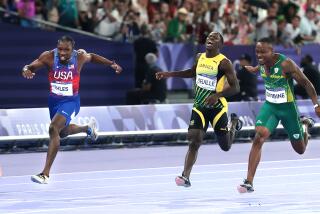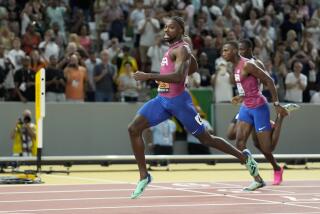President of Georgia raises questions about luge track design
- Share via
The president of the Republic of Georgia, speaking to reporters a day after one of his nation’s athletes died in a luge training run, raised concerns about the design of what is the world’s fastest track at the Whistler Sliding Center.
“There were questions being asked about this place,” President Mikheil Saakashvili said. “There were suggestions that the wall should have been higher there.”
Nodar Kumaritashvili was killed when he lost control of his sled at about 80 mph, flipped over the lip of the track and slammed into an unpadded roof support post. Saakashvili reacted to suggestions that the 21-year-old athlete lacked the necessary experience to handle the course.
“They said that what happened yesterday was because of human error,” the president said. “Well, with all due respect . . . one thing I know for sure, that no sports mistake is supposed to lead to a death.”
Shortly before his fatal run, Kumaritashvili called home to his parents (his father had been a luger) to tell them that they “would be proud of him,” Saakashvili said.
The Georgian government hopes to build a sliding track -- the country currently has none -- and name it after Kumaritashvili, who trained at facilities throughout Europe.
-- David Wharton
Big ratings for opening ceremony
According to numbers released by NBC, Friday night’s opening ceremony telecast was the most-watched for a non-U.S.-hosted Winter Games with 67.5 million viewers.
According to rankings by time zone Friday night, the two places that didn’t get a live broadcast, Mountain and Pacific, had the best ratings.
Not surprisingly, the Seattle market did the best. Vancouver is practically next door. A little surprisingly, Los Angeles didn’t crack the top 20 market-wise. Yet West Palm Beach was fifth. Go figure.
Here are the top markets: 1. Seattle, 25.9 rating/47 share; 2. Milwaukee, 25.8/43; 3. Denver, 25.4/44; 4. St. Louis, 23.7/40; 5. West Palm Beach, 23.3/35.
-- Diane Pucin
Simon Ammann wins first medal of the Games
The first medal of the Games went to Swiss ski jumper Simon Ammann in the normal hill competition. It was his third Olympic title, having won both the normal and large hill competition in Salt Lake City in 2002.
Adam Malysz of Poland was second and Gregor Schlierenzauer of Austria finished third. It was a disappointing day for the Austrians, who have four of the five top jumpers in the world rankings. But the best they could do was a single bronze medal.
-- John Cherwa
Slovakia picks up a medal in the biathlon
Anastazia Kuzmina of Slovakia missed only one of 10 shots and finished in 19 minutes 55.6 seconds to win the women’s 7.5-kilometer sprint. It was her first Olympic gold.
Magdalena Neuner of Germany was second and Marie Dorin of France was third. The race was contested over a course that had fertilizer applied to harden the snow after days of rain.
The U.S. finishers were Sara Studebaker (45th), Laura Spector (77th), Lanny Barnes (78th) and Haley Johnson (80th).
-- John Cherwa
Slow going on ice
There was some debate about how the near-sea-level ice at Richmond Olympic Oval would be for competition. Saturday delivered the verdict: It would not be easy.
It didn’t promote speed in the men’s 5,000-meter event that opened the speedskating slate, and U.S. team member Chad Hedrick expected that to make the 1,000-meter and 1,500-meter races a little more grueling for American favorites.
“In Salt Lake City and Calgary, a lot of the pure sprinters were able to stay in the 1,000-meter because the glide was there and they weren’t having to work as much,” Hedrick said after an 11th-place finish Saturday. “The 1,500 meter skaters are going to do a lot better than the 1,000 [skaters]. The 1,000 is going to feel like 1,500 meters, and 1,500 meters is going to feel like 2,000 meters, to be honest.”
-- Brian Hamilton
More to Read
Go beyond the scoreboard
Get the latest on L.A.'s teams in the daily Sports Report newsletter.
You may occasionally receive promotional content from the Los Angeles Times.






